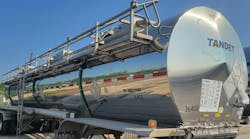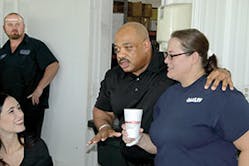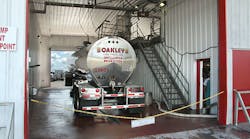OVER the years, Oakley Transport Inc developed a diversified portfolio of liquid bulk foodgrade cargoes. However, distilled spirits are among the products that keep the fleet running hardest across North America.
Currently, the Lake Wales, Florida-based tank truck carrier’s trailer fleet is focused on maximum payload capacities and safety assurances. Other foodgrade cargoes include juices, cooking oil, sweeteners, and other cargoes that are classified as foodgrade. The carrier is internationally kosher certified.
“We’ve come a long way since we started hauling orange juice in 1986,” says Thomas E Oakley, president of Oakley Transport and Oakley Dedicated Logistics, divisions of The Oakley Companies. “Food hauling is a great business, and we are a 100% liquid food hauler. We understand the liquid bulk food hauling business very well, and we want to be the premier carrier in this business.
“We are growing our fleet, and our goal is to reach at least 500 tractors. We should have 450 trucks on the road by 2015, and some of them will be natural gas fueled. We’re building what we believe is the best management team in the business. My belief is that if you surround yourself with the best people, you can accomplish great things. We’re doing that.”
Diversified operation
Today’s operation is far different from the one that the Oakley family launched and incorporated as Oakley Groves Inc in 1961. The independent citrus fruit brokerage was based in Dade City, Florida. Soon after, Oakley Brothers was established to focus on the harvest and hauling sector of the citrus industry. Oakley Brothers was later merged into the parent company.
“We’re still the largest citrus fruit hauler in Florida,” Oakley says. “We hauled 19 million boxes of fruit during this year’s season that ended in June. Oakley hauled a high of 48 million boxes during the 2003/2004 season. However, the crop used to be in the 254-million-box range.”
Following two hard freezes in 1982 and 1984, the family decided it was time to make some changes. In 1986, Oakley Transport was formed and the company headquarters was moved south of I-4 to Lake Wales.
“In the wake of those freezes, we wanted to be less dependent on the Florida orange crop,” Oakley says. “Later we realized we couldn’t succeed just by hauling orange juice in tank trailers. We began our effort to diversify in 1987-88, and now we carry a whole array of foodgrade products. Our traffic is very well balanced today throughout North America with great alliances with our client base.”
Operations center
Operations are directed from the 27-acre Lake Wales headquarters complex that includes an administration building, dispatch center, maintenance facility, and three-bay foodgrade wash rack. Oakley Transport also has a terminal in Laredo, Texas, and several satellite locations where tractors and trailers are based for the strategic logistics of customers and drivers. The carrier currently runs 350 tractors and 550 tank trailers (with another 100 tank trailers on order). Annual total mileage for the fleet is in the 95 million miles range.
“We are operating at capacity today, and we definitely need more drivers,” says Tyson Sherman, Oakley Transport chief financial officer. “The economy is stable, and the slow, but steady, growth has been beneficial. Demand for food hauling is growing and we continue to meet the challenge”.
The carrier is working hard to build up capacity, and it has set some aggressive growth objectives. “Our goal is to grow 20% annually,” Sherman says. “It’s a tough goal, but we believe it is achievable. We want 95% of our trucks operating at all times, and we want a ratio of 1.7 tank trailers to each tractor. We’re below that right now, but we are trying to close the gap with annualized acquisitions of trailers.”
Sherman and the rest of the Oakley Transport management team keep a close watch on the performance metrics using a graphic dashboard that was developed in-house. Displayed in the dispatch center on a wide-screen television, the dashboard tracks a range of key performance indicators for the fleet.
One way the carrier is trying to improve productivity is by opening a strategically located series of satellite hubs. “We plan to open four of these locations in the next two years in the Southeast,” says Craig A Stephens, director of operations. “Many of these hubs will be at tactically chosen locations to support customers on a regional basis while enhancing driver retention”.
Oakley Transport tractor-trailer rigs will operate within a 500-mile radius of the each hub. “Our goal is to provide more of a regional service in these locations,” Stephens says. “We’ll do more relay activity, where we hand off a trailer from one tractor to another for expedited services for our customers. We believe this will help us with driver retention, as well as provide the timely service our customers want.”
While tractors and tank trailers are a critical part of the operation, Oakley Transport is not just a trucking company, according to Matt Tocci, director of customer relations. “We are a transporter of quality-assured foodgrade commodities,” he says. “We are an integral part of the food supply chain, and we take quality very seriously.”
Company executives have been closely following development of new food transport regulations by the Food and Drug Administration (FDA). “Food safety is of paramount concern for Oakley Transport, and we believe we are already ahead of these proposed regulations,” Tocci says. “We believe our standards are above and beyond those of the industry.”
Oakley adds: “This rule will impact foodgrade tank truck carriers. It is going to be a wakeup call for some carriers. We will have to take more care in documenting what we are doing to ensure food safety.”
On the tank cleaning side, the carrier closely monitors operations, both in-house and at commercial wash racks. “We supervise and audit tank cleaning operations across our system,” says Lance Cain, director of sales. “We have a microbiologist under contract who performs spot audits of wash racks.”
Oakley Transport maintains detailed records of every load hauled by every tank trailer in its fleet. The records are retained for the life of the trailer. Products hauled are described very precisely, and those details are used to build exact cleaning recipes. Every detail of every tank cleaning is recorded and tracked.
Driver role
Drivers may be the most important factor in safe food transport, and there just aren’t enough of them. “Like other fleets, we just can’t get enough of the drivers we want to hire,” Oakley says.
Stephens adds: “We are at the front of the production line in the food industry, and drivers are the public face of Oakley Transport. They are key members of our team. We target experienced truck drivers in our hiring, and we look for people who fit our operation.”
Two prime examples of the type of drivers Oakley Transport seeks out are David Fredericksen and Walter Letterman, who have been with the carrier for about three years. On August 11, the driving team was en route to California with a load of orange juice. Just outside Biloxi, Mississippi, on westbound I-10, the dash cam in their tractor captured a horrific collision.
After stopping just short of the crash debris on the freeway, Fredericksen grabbed a fire extinguisher and ran to the car, which had burst into flames. When he reached the car, he saw a one-year-old girl in a car seat. Fredericksen immediately grabbed the girl from the backseat and carried her to safety. Other motorists helped rescue a woman from the front seat before the car was completely engulfed in flames.
Asked about the event, Fredericksen credits his Christian faith and values instilled by his father. He said he didn’t see his actions as heroic. He said those who helped with the rescue were just Good Samaritans and Good Americans. It’s something truck drivers do every day.
Experienced drivers
Drivers hired by Oakley Transport typically have 10-15 years of over-the-road truck driving experience. Many are recruited from flatbed, refrigerated, and van trailer operations.
“We look for exceptional candidates with a great work record and good performance in their pre-hire testing,” said Darryl K Carter, vice-president of human relations and risk management. “We hire these people, train them, mentor them, and coach them to get the very best results.”
Every newly hired driver goes through a five-day orientation, followed by four weeks of on-the-job training. In the future, the training program will incorporate a driving simulator that has been ordered for the Oakley Safe Driving Center at the headquarters terminal in Lake Wales. Annual retests for all drivers also will be performed on the simulator.
“We’re focusing on continuous improvement with our driver programs,” Carter said. “Annual retraining is an important part of that. We use the Smith System for defensive driving training, as well as Pro Tread computer-based training.
“We’re investing more money in safety and driver retention programs. We’ve raised driver pay as part of our effort to reduce turnover. While our turnover remains below industry standards, we continue to monitor its trend daily.”
Driver-focused programs include development of a career path, a private healthcare exchange with eight different plans, a committee to help resolve driver issues and develop a more satisfying work environment for drivers, more active driver coaching, management open door policy, and an array of award programs.
Award programs launched in 2014 include Driver of the Month, Driver of the Year, Employee of the Quarter and Year, Regional/local Driver of the Quarter and Year, Team Driver of the Quarter and Year, Pride and Polish Award (focused on truck condition), and a Million Miles Safe Driving Award. Ten drivers already qualified for the Million Miles award.
Safe tractors
Great equipment also makes a difference in driver retention. Oakley Transport has standardized on Volvo tractors. “We have some of the best equipment on the road,” Oakley says. “Volvo builds a very safe truck, and it has already saved the lives of two drivers. In addition, we are focused on improving our fuel efficiency with the newest technology supplied with the Volvo D13 engines.”
Natural gas fueled tractors are coming next year. The move into natural gas starts with construction of a compressed natural gas fueling station near the Lake Wales headquarters that should open in early 2015. Fifty natural gas fueled tractors should be on the road by June 2015.
Most of the Volvo tractors in the fleet have Eaton Fuller 10-speed manual transmissions, but Oakley Transport is trying a few Volvo iShift automated transmissions. All of the tractors are wired for shorepower and have Carrier Comfort Pro auxiliary power units to eliminate unnecessary idle time.
“We chose the Carrier APU because it has a generator/alternator system and uses no glowplugs,” says Peter J Nativo, director of maintenance. “It was important to avoid glow plugs on the APU because we are hauling hazardous materials. Having an APU on a tractor saves us a gallon of diesel per hour when a driver is in the sleeper.”
Safety systems include the full Bendix Wingman package, which comes with adaptive cruise control, collision mitigation, and roll stability. By the end of the year, the fleet should be 100% on electronic driver logs, which are handled through Qualcomm on-board computers.
“Electronic driver logs are making us better at time management, which is important because we have lost 6% to 8% in driver productivity under the most recent changes in the hours-of-service regulations,” Oakley says.
Other technology on the Volvo tractors includes a computerized pre-trip report function that can be used with a walk-around vehicle inspection. Tractors have on-board diagnostics that will report equipment problems to Volvo and Oakley Transport.
The carrier has been buying tractors with 63-inch sleepers, and 73-inch sleepers are on order for team operations. For product handling, the tractors are equipped a Paragon hydraulic system used to power trailer-mounted stainless steel Gardner Denver pumps.
All of the extra equipment is installed at the Fontaine Prep Center in New River Valley, Virginia. The trucks are delivered to Oakley Transport road ready.
Food grade trailers
Most of the stainless steel tank trailers are supplied by Brenner Tank Inc, Walker Stainless, and Polar Tank. Recent purchases have included some trailers constructed from lean duplex stainless steel.
Trailers range in capacity from 5,000 gallons for an insulated sweetener tanker to 8,000 gallons for 50 uninsulated alcoholic beverages trailers in dedicated plant-to-plant service. A majority of the trailers in the Oakley Transport fleet have a 7,000-gallon capacity.
Three-quarters of the trailers in the fleet are code tanks built to DOT407 requirements. The remainder are non-code sanitary tank trailers. Most of the trailers are insulated and are piped for in-transit heat. To avoid the potential for cargo contamination, the carrier uses propylene glycol to provide in-transit heat.
Tank hardware includes a Betts discharge outlet that was designed for Oakley Transport. A Girard pressure/vacuum-relief vent is used on the DOT407 trailers. The stainless steel pump cabinet is heated and can be fully sealed for safety and security.
Fleet maintenance
Routine preventive maintenance for tractors and trailers is handled in-house at the company maintenance shop in Lake Wales. All of the vehicles are serviced at 90-day or 25,000-mile intervals.
Volvo handles most of the major tractor service work. On the trailer side, Oakley Transport has its own code shop for handling cargo tank inspection, testing, and repair. “We have two code welders who focus most of their time on modification work,” Nativo says.
All in all, Oakley Transport has the system in place that should take it to 500 trucks and give it the ability to continue meeting customer needs. ♦
Editor’s Note
Darryl K Carter, Oakley Transport Inc vice-president of human relations and risk management was instrumental in coordinating the terminal visit, photos, and interviews that are part of this month’s Bulk Transporter cover story on Oakley Transport Inc.
Thomas Oakley issued the following statement: “To say that Darryl will be missed is an understatement. Darryl was an integral member of the Leadership Team at Oakley. He was dedicated to helping others, and his passion for our drivers was second to none.
“While all of us at Oakley are struggling with this sudden loss, we also know that he built strong relationships. One of the things helping us through this time is our confidence in his faith in Christ. He regularly leaned on his faith in helping others and in framing his day-to-day priorities.
“2 Corinthians 1 states “Praise be to the God and Father of our Lord Jesus Christ, the Father of compassion and the God of all comfort, who comforts us in all our troubles, so that we can comfort those in any trouble with the comfort we ourselves have received from God.
“I don’t think there is anybody I know who more exemplified the act of comforting others than Darryl Carter. We were fortunate to have had him work with us, and share the last four and a half years of his life with us.” ♦











